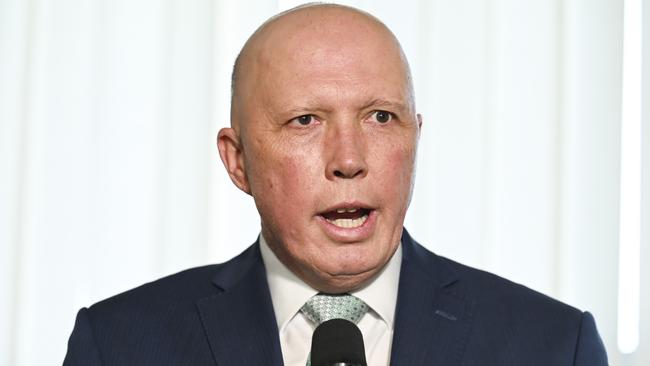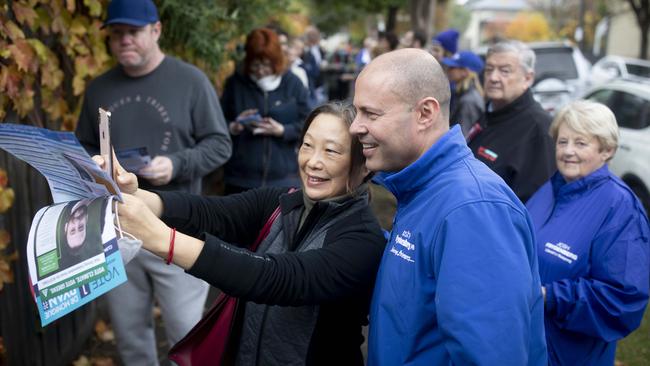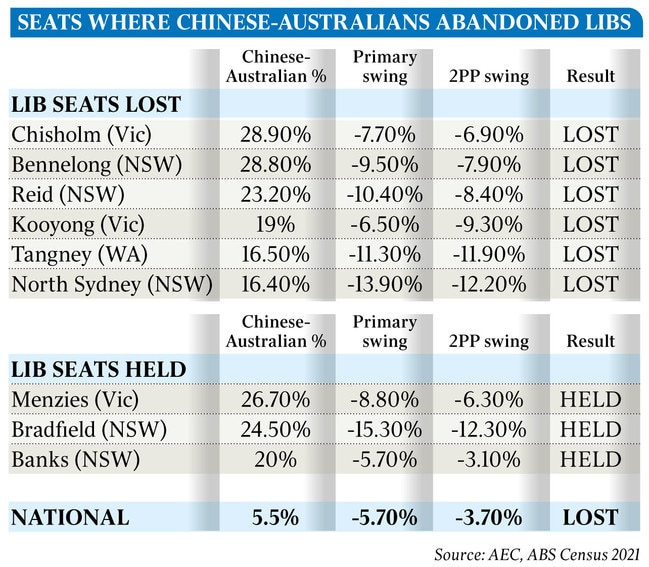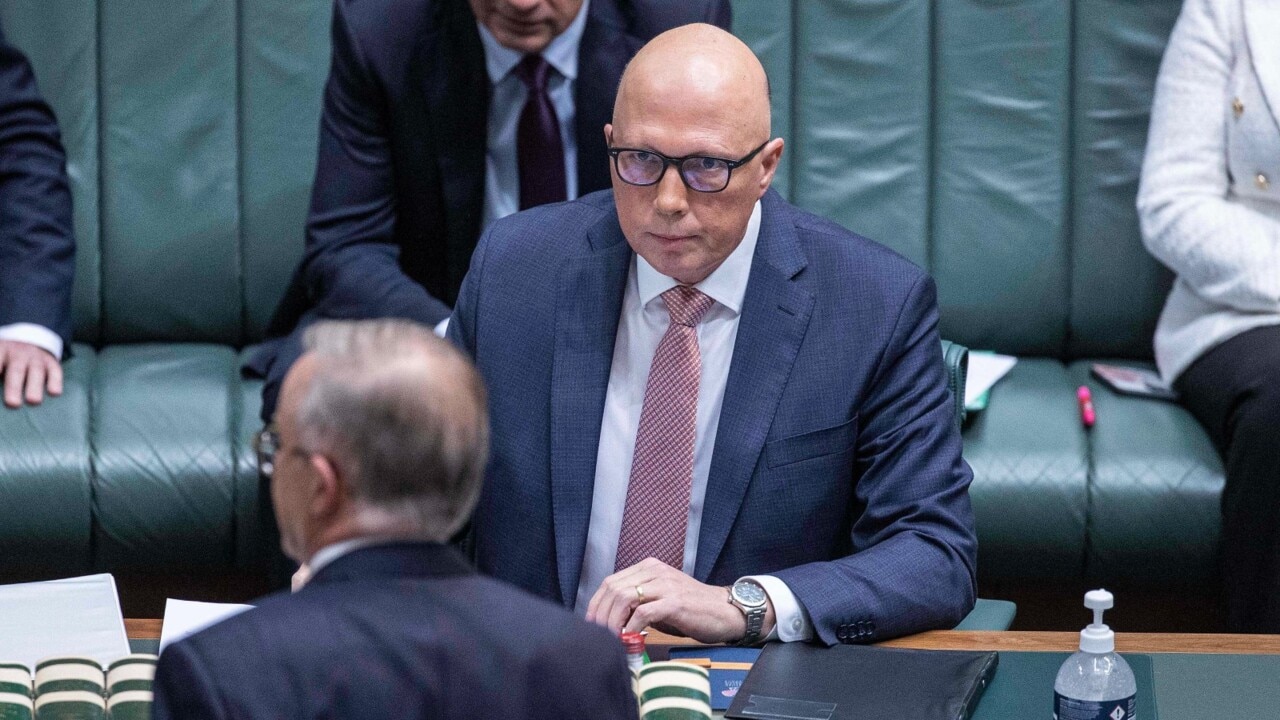Liberals pressure Dutton to ease up on China hard line
Peter Dutton is under pressure to adopt a more nuanced approach to Beijing, with analysis revealing massive swings against the Liberal Party among Chinese-Australians.

Opposition Leader Peter Dutton is under pressure to adopt a more nuanced approach in the Coalition’s attacks on Beijing, with new analysis revealing massive swings against the Liberal Party in seats with high numbers of Chinese-Australian voters.
The Australian can reveal the Liberal Party review into its disastrous campaign – led by former federal director Brian Loughnane and opposition frontbencher Jane Hume – will look at how to win back Chinese-Australians who abandoned the party on May 21.
The review, which has received a record number of submissions, will include substantive responses to the rise of the teal independents and electoral impacts of the Coalition’s climate change policies.
Senior Liberal Party sources say the post-mortem into the Chinese-Australian voter backlash would focus on the Morrison government’s anti-China rhetoric, which peaked ahead of and during the campaign.

Despite acknowledging the serious threat posed by Xi Jinping’s Chinese Communist Party and the People’s Liberation Army’s hostile actions, party figures say not enough was done to separate voters of Chinese heritage from the former government’s aggressive pushback against Beijing.
Mr Dutton, a leading hawk on China, is understood to be aware of internal calls to make clear that Coalition criticism is focused on Mr Xi and the CCP to avoid alienating pro-business Chinese-Australian voters who backed Scott Morrison in 2019.
New Australian Bureau of Statistics census data overlaid with election results shows above-average swings against the Liberal Party in electorates with high numbers of Chinese-Australians.
While Liberal strategists expected an electoral backlash, the scale of revolt from Chinese-Australians has been linked with Labor and independents winning a swath of seats in Sydney and Melbourne. As part of the review, to be finalised by December, Mr Loughnane and Senator Hume are looking at how the Liberal Party underestimated the size and scope of the Climate 200-backed teal independents campaign.
Liberals insiders are keen to ensure the teals’ wave, which claimed the blue-ribbon seats of Kooyong, Goldstein, North Sydney, Curtin, Wentworth and Mackellar, doesn’t overshadow the party’s tanking vote in Chinese-Australian communities.

The Liberals, who held seven of the top eight electorates with the highest number of Chinese-Australian voters, clung to three after suffering primary swings against the party exceeding other seat-by-seat results. Across the 15 top Chinese-Australian electorates, the party lost six out of nine seats.
Campaign strategists have raised concerns about resentment towards the Liberal Party at polling centres and community events, reporting that while many Chinese-Australians prefer the Coalition on economic matters, many with extended family and friends in China were concerned about its hardline rhetoric.
Former treasurer Josh Frydenberg – who led the Chinese foreign investment crackdown in response to Beijing’s rising aggression and ban on Australian exports – lost his inner-Melbourne seat of Kooyong to teal independent Monique Ryan. Census data shows the seat, once held by Robert Menzies and covering the exclusive suburbs of Kew and Hawthorn, is now home to more than 31,000 Chinese-Australians. From 2016 to 2021, the percentage of Chinese-Australians in Kooyong grew from 11.6 to 19 per cent.
The nearby seats of Chisholm and Menzies, which boast Chinese-Australian voting bases of 28.9 per cent and 26.7 per cent, registered large swings to Labor and minor parties. While Keith Wolahan held Menzies by just 1377 votes, Gladys Liu was easily beaten by Labor’s Carina Garland.

In the Perth seat of Tangney, which has almost 31,000 Chinese-Australian voters, former special minister of state Ben Morton lost to Labor’s Sam Lim. Mr Lim, who is of Chinese-Malay heritage, claimed Tangney on the back of a 12 per cent swing against Mr Morton, who spent much of the campaign supporting Mr Morrison.
Opposition manager of business Paul Fletcher, whose blue-ribbon northern Sydney seat of Bradfield is home to almost 41,500 voters of Chinese ancestry, suffered a 15.3 per cent swing against him as voters swung behind independent Nicolette Boele.
Other Sydney seats with large Chinese-Australian communities, including Bennelong, Reid and North Sydney, fell to Labor and teal independent Kylea Tink.
David Coleman, the MP for Banks, which has a 20 per cent Chinese-Australian voter base, was the only Liberal to stem the electoral bleeding. The former immigration minister, who claimed the working-class seat from Labor in 2013, is considered a strong grassroots campaigner with close links to Chinese-Australian community leaders.




To join the conversation, please log in. Don't have an account? Register
Join the conversation, you are commenting as Logout